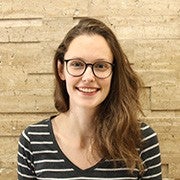Program
Doctor of Philosophy (PhD) in Electrical and Computer Engineering, Biomedical Engineering specialization
 Why
did
you
decide
to
pursue
a
graduate
degree?
Why
did
you
decide
to
pursue
a
graduate
degree?

I chose to pursue a graduate degree (initially the Master of Applied Science (MASc) program) because I wanted to specialize in the field of medical imaging. Graduate studies allows you to delve much deeper into a specific field than you can during undergraduate studies. With a graduate degree I was hoping to prepare myself for research-based industry positions. Upon entering grad school, I fell in love with the research freedom that you have in academia. As a grad student I have the resources and support to investigate any meaningful questions I have in the field. For this reason, I chose to switch programs - from the MASc to the PhD program.
Why did you decide to study at the University of Waterloo?
I chose to stay at Waterloo for grad school for a few reasons, some professional and some personal. Professionally, Waterloo has a huge advantage when it comes to their intellectual property policies. Any idea you create in grad school belongs to you and not the University which allows you to always have that thought of entrepreneurship floating in the back of your mind. In addition, Waterloo has great support for students wishing to go international during their studies. This support allowed me to spend four months of my degree so far collaborating in-person with a research group in Italy. On a more personal note, I have grown to love Kitchener-Waterloo over the past several years and I am more than happy to stay in the area.
What is it specifically that attracted you to our program?
I pursued graduate studies in electrical and computer engineering (ECE) because it was the best fit to study my area of interest – medical imaging. Research groups in ECE have a broad focus on several aspects of medical imaging system engineering, not just on the low-level device and circuit design, but also on software, imaging algorithms, and system integration. This breadth of research allows me to learn and grow in several technical areas while providing me with a better understanding of the technology as a whole. In addition, the depth of expertise in the ECE department provides the opportunity to dig deeply into any specific aspect of your research with adequate support and resources available.
What was the best surprise about living in the Kitchener-Waterloo area?
I think Kitchener-Waterloo (KW) has a lot to offer once you get off campus and explore. There are tons of small locally owned businesses in KW which are fun to discover. Also, since the area is very multicultural, there are so many amazing restaurants to try out from almost any part of the world.
Finally, the KW area has a lot of pride in its community and there are always different events going on to celebrate something. If you take some time to look around, you’re sure to find something you’ll enjoy.
What advice do you have for new graduate students?
To new graduate students, I would emphasize one thing in particular: take advantage of your research freedom. This is one time in your life when you get funding and at least a couple years to study a topic that you are interested in, so take advantage of it. Use this time to ask questions and explore new topics that you aren’t familiar with. Try to take courses that intimidate you and see what you learn.